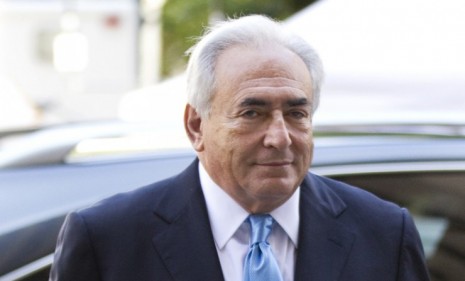Dominique Strauss-Kahn's 'stunning change of fortune': 3 lessons
The sexual assault case against the former IMF chief is crumbling, and teaching us some hard lessons about xenophobia and prematurely presumed guilt

A free daily email with the biggest news stories of the day – and the best features from TheWeek.com
You are now subscribed
Your newsletter sign-up was successful
Since Dominique Strauss-Kahn was charged with raping a New York hotel maid in mid-May, he's been placed under house arrest, been accused of sexual assault by another woman, had his hopes to become France's next president all but dashed, and been replaced as International Monetary Fund head by Christine Lagarde — all before the case went to trial. Now, in what's being called a "stunning change of fortune" for Strauss-Kahn, The New York Times reports that the case against him is falling apart, with his accuser looking increasingly unreliable. Investigators say she's been caught in a number of lies. She also reportedly had conversations with an incarcerated man about her encounter with Strauss-Kahn less than a day after it occurred, and investigators say the man was one of several people who made cash deposits, totaling nearly $100,000, in the woman's bank account. (More details here.) Strauss-Kahn was released from house arrest late Friday morning, and his bail money was returned. He returns to court on July 18. In the meantime, what lessons can we learn from this affair? Here are three:
1. It's dangerous to presume guilt, especially in the online age: Strauss-Kahn's "legally-based presumed innocence has been inconsequential to the penalties that he's already received, and that's something that should worry us," says Steve Clemons at The Atlantic. This is a tough lesson for internet writers and commentators. They can quickly destroy a man with little evidence, and if they are wrong, there is little permanent damage to their own careers and credibility. Strauss-Kahn, however, suffered irreparable damage. Whether he is innocent or guilty, one thing seems certain: He's unlikely to get his IMF job back, or seriously challenge Nicolas Sarkozy now.
2. But we shouldn't presume the accuser is guilty, either: It's now come to light that the accuser isn't the "devout, celibate young widow," that she first appeared to be, says Judith Thurman at The New Yorker. "It will now be very difficult, if not impossible, to put this woman on a witness stand," and Strauss-Kahn may be the victim of a "gross injustice." But, just as we shouldn't have rushed to convict him in the court of public opinion, we shouldn't now do the same to the accuser. "I find it depressing that, in 2011, a woman is presumed guilty if she isn't innocent."
The Week
Escape your echo chamber. Get the facts behind the news, plus analysis from multiple perspectives.

Sign up for The Week's Free Newsletters
From our morning news briefing to a weekly Good News Newsletter, get the best of The Week delivered directly to your inbox.
From our morning news briefing to a weekly Good News Newsletter, get the best of The Week delivered directly to your inbox.
3. America needs to rein in its "Europhobia": There's an undercurrent of xenophobic hostility in the way Strauss-Kahn has been treated, says Andrew M. Brown at Britain's Telegraph. Call it "Europhobia" — this idea that French men in particular are primitive and uncontrollable when it comes to sex. "We were encouraged to think of him bursting out of the bathroom in his towelling robe, hairy-chested and rampaging, completely unable to stop himself from committing a horrendous sexual attack." But now that his accuser's credibility is faltering, "the Europhobes will need to revise that crude simplification of events."
A free daily email with the biggest news stories of the day – and the best features from TheWeek.com